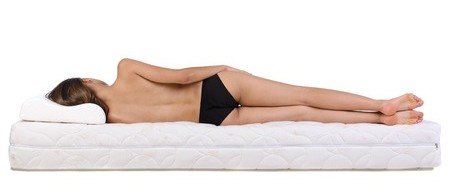Some questions we are often asked at Kings Cross Osteopathy are related to getting comfortable at night when dealing with back or neck pain. There are no simple answers to this question and much depends on personal preference. Even with the same condition, people may not find the same relief. Here are some strategies that you may find useful.
Mattress choice: This is almost entirely up to personal preference. There are no conclusive studies on what kind of mattress is best for back pain. There is an urban myth that the Japanese don’t suffer from back pain as they sleep on the floor or a hard futon; therefore sleeping on a hard mattress is best for back pain. I can assure you that back pain is just as prevalent in Japan as any other country. In fact, there are more convincing arguments that as soft a mattress as tolerable will support the spine better than a hard one.
The theory behind the argument for soft mattresses is as follows. The heaviest points of contact with the mattress in any position (except lying completely flat, face down.) are the hips and the shoulders. Thinking of the spine as the line that connects the two structures, a harder mattress will create more side bending than the soft one that allows the shoulders and hips to sink in.
This is just a theory. Whatever positions you find comfortable is best for you.
Pillow Choice: Again, I would defer to whatever setup makes you comfortable enough to get to sleep. Some useful information here would be that supporting the neck is actually the most important function of a pillow. Whether hard or soft, the neck must be supported to allow it to be in a neutral position, as if you were upright and facing forward. Orthopaedic style pillows do this with a lump that supports the neck, and a lower platform for the head. You can recreate this effect (side lying) by using a rolled up towel to bolster the space between your shoulder and neck, and have the pillow/s behind to support the head.
Pillows between the knees can be useful for relieving back pain when on your side, and under the belly and hips when on your front. This won’t work for everyone, but worth a try.
If your back or neck pain is troubling you at night, consult Ashley or Luke at Kings Cross Osteopathy. Once your back or neck pain is diagnosed and treated, we’ll be able to advise on your specific circumstances and what will be the best way to get a good night’s rest.

